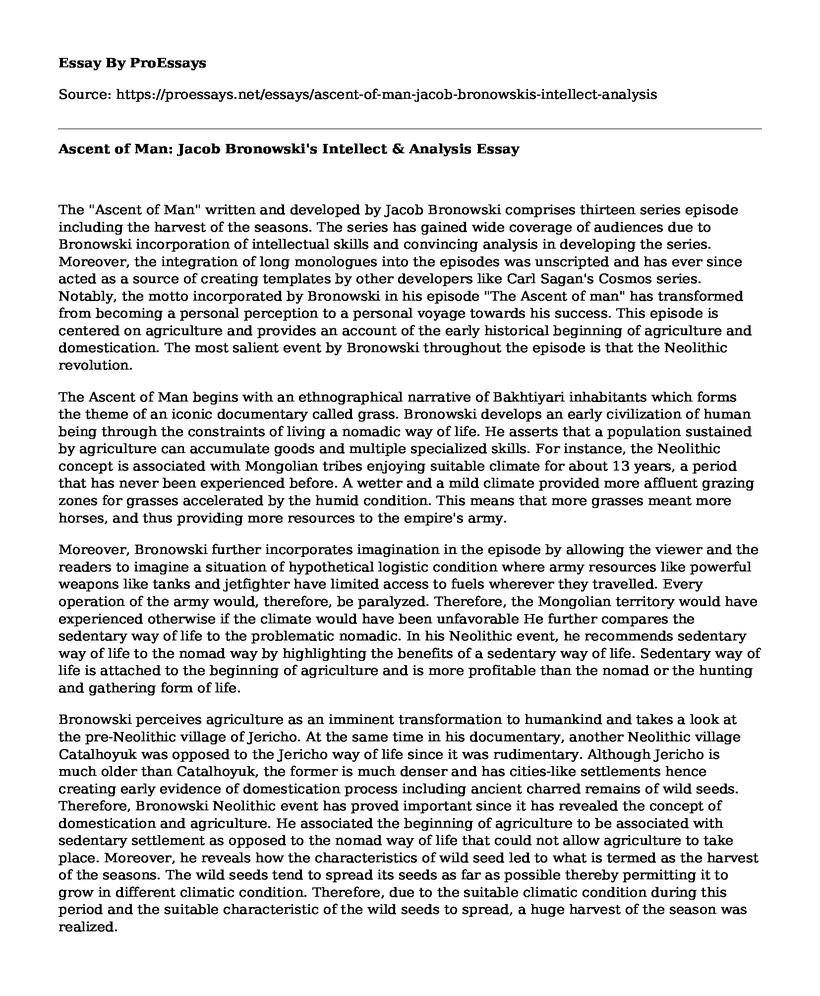The "Ascent of Man" written and developed by Jacob Bronowski comprises thirteen series episode including the harvest of the seasons. The series has gained wide coverage of audiences due to Bronowski incorporation of intellectual skills and convincing analysis in developing the series. Moreover, the integration of long monologues into the episodes was unscripted and has ever since acted as a source of creating templates by other developers like Carl Sagan's Cosmos series. Notably, the motto incorporated by Bronowski in his episode "The Ascent of man" has transformed from becoming a personal perception to a personal voyage towards his success. This episode is centered on agriculture and provides an account of the early historical beginning of agriculture and domestication. The most salient event by Bronowski throughout the episode is that the Neolithic revolution.
The Ascent of Man begins with an ethnographical narrative of Bakhtiyari inhabitants which forms the theme of an iconic documentary called grass. Bronowski develops an early civilization of human being through the constraints of living a nomadic way of life. He asserts that a population sustained by agriculture can accumulate goods and multiple specialized skills. For instance, the Neolithic concept is associated with Mongolian tribes enjoying suitable climate for about 13 years, a period that has never been experienced before. A wetter and a mild climate provided more affluent grazing zones for grasses accelerated by the humid condition. This means that more grasses meant more horses, and thus providing more resources to the empire's army.
Moreover, Bronowski further incorporates imagination in the episode by allowing the viewer and the readers to imagine a situation of hypothetical logistic condition where army resources like powerful weapons like tanks and jetfighter have limited access to fuels wherever they travelled. Every operation of the army would, therefore, be paralyzed. Therefore, the Mongolian territory would have experienced otherwise if the climate would have been unfavorable He further compares the sedentary way of life to the problematic nomadic. In his Neolithic event, he recommends sedentary way of life to the nomad way by highlighting the benefits of a sedentary way of life. Sedentary way of life is attached to the beginning of agriculture and is more profitable than the nomad or the hunting and gathering form of life.
Bronowski perceives agriculture as an imminent transformation to humankind and takes a look at the pre-Neolithic village of Jericho. At the same time in his documentary, another Neolithic village Catalhoyuk was opposed to the Jericho way of life since it was rudimentary. Although Jericho is much older than Catalhoyuk, the former is much denser and has cities-like settlements hence creating early evidence of domestication process including ancient charred remains of wild seeds. Therefore, Bronowski Neolithic event has proved important since it has revealed the concept of domestication and agriculture. He associated the beginning of agriculture to be associated with sedentary settlement as opposed to the nomad way of life that could not allow agriculture to take place. Moreover, he reveals how the characteristics of wild seed led to what is termed as the harvest of the seasons. The wild seeds tend to spread its seeds as far as possible thereby permitting it to grow in different climatic condition. Therefore, due to the suitable climatic condition during this period and the suitable characteristic of the wild seeds to spread, a huge harvest of the season was realized.
Cite this page
Ascent of Man: Jacob Bronowski's Intellect & Analysis. (2023, Jan 05). Retrieved from https://proessays.net/essays/ascent-of-man-jacob-bronowskis-intellect-analysis
If you are the original author of this essay and no longer wish to have it published on the ProEssays website, please click below to request its removal:
- Paper Example on Freedom and Determinism
- Ethics Auditing Essay Example
- Failure Is a Better Teacher Than Success Essay
- Claude McKay: An Immigrant's Poem of Experience in America - Essay Sample
- Division of Law: Greek Society's Slaves vs. Free People - Essay Sample
- Unlocking the Secrets of Our Neandertal Relatives: 400,000 Years of History - Essay Sample
- Essay Sample on William Sherman: Union Major General & Father of Total War







